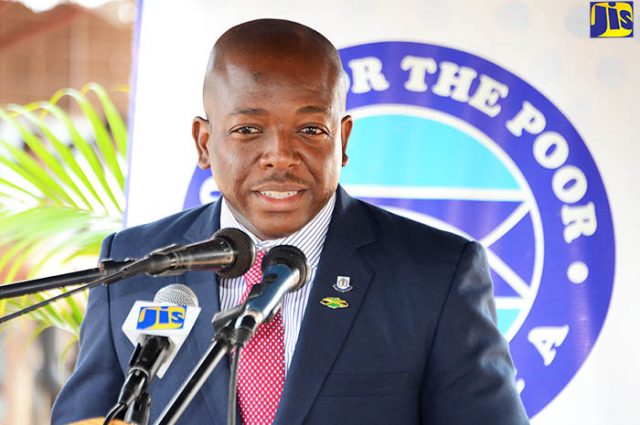JIS: The Ministry of National Security and the Jamaican Foundation for Lifelong Learning (JFLL) is to sign a Memorandum of Understanding (MOU) to offer educational opportunities to inmates and other interest groups.
In an interview with JIS News, Minister of State in the Ministry, Pearnel Charles Jr., says offering educational programmes to persons in juvenile confinement, prisons or at-risk social groups is a fundamental component to the rehabilitation process and the fight against crime.
He argues that this can have a direct impact on the country’s rate of recidivism and ultimately crime, adding that education behind bars means a greater likelihood of post-release employment, stability and independence for the individual.
“One of the core areas of focus in the ‘Rehabilitation for Reintegration’ agenda is to ensure that all inmates and wards leave our institutions literate and better than when they went in,” the State Minister says.
He notes that the JFLL has had tremendous success in empowering adult learners to become literate through the many programmes they have, and he is confident the inmates will grasp the opportunity.
“Many of our inmates and wards are thirsty to learn and if we intend to abate the cycle of violence, it makes sense to invest in them, hence this MOU,” Mr. Charles says.
“The programme is a practical initiative with clear results. It will help us to see them move from basic literacy to obtaining high school level certification. Many of the inmates have skills but are weak in reading. This project is to help them make the transition to literacy and HEART vocational programmes,” he explains.
The State Minister says one of the primary objectives of the Ministry is to ensure that persons doing time are prepared for success upon release and to help them reintegrate, get jobs, provide for their families and ultimately stay away from crime.
“Correctional education is a cost effective initiative. Every dollar spent on prison education, juvenile centre or at-risk youth groups could save the country millions in fighting crime and prevent re-incarceration,” he tells JIS News.
He notes that it is easier to govern an educated man or woman, because that person should be able to read and understand Government policies and the rationale behind laws.
For his part, Executive Director of JFLL, Worrel Hibbert, said the MOU will be signed with the view of equipping the adult learner with knowledge, skills and the attitude that will make him or her “empowered to achieve their fullest potential.”
He tells JIS News that the JFLL is eager to enter the partnership agreement with the Ministry and the Department of Correctional Services to offer a “second chance” to the youngsters in juvenile detention facilities, individuals who take part in community intervention programmes and inmates housed in correctional facilities across the island.
“We want to pay more attention to the literacy programmes that are available in our prisons and correctional centres,” Mr. Hibbert says.
For her part, Director of Educational Services at the JFLL, Miss Rhoda Crawford, says the agency is very excited about the partnership, adding that the synergy will significantly advance the justice reform programmes.
“I am encouraged by the Ministers’ desire to get things started and the support and commitment from the Ministry to assist us (JFLL) in implementing this life changing opportunity for the inmates and juveniles,” she says.
Miss Crawford notes that the MOU will allow the agency to engage over 4,000 persons from various groups by offering “adult basic (mastery in literacy and numeracy) and adult secondary education (high school equivalency) to those individuals who want a second chance.”
This access, she says, will give them learning opportunities to pursue personal, academic and professional goals.
She adds that from discussions there are plans to start the process of the literacy rehabilitation with the signing of the MOU by the end of this month.
“Once the paper works are done, our first plan of action is to go into the institutions and start by accessing the learners, to see where they are (academically) and then do the placement based on their educational background,” Miss Crawford explains.
She says the proposal is to implement the JFLL’s two-year High School Diploma Equivalency (HSDE) programme in the correctional system, with the hope of giving the inmates secondary level certification.
The HSDE programme, she notes, takes a learner from basic literacy to the proficiency level where they are able to sit Caribbean Secondary Education Certificate (CSEC) subjects.
“We have a track record of being able to move an individual from zero literacy to the attainment of CSEC subjects, so we are confident that this agency (JFLL) can give the impactful results that will change the lives of the people and ultimately impact the crime rate,” Miss Crawford says.
She adds that the proof of such achievement was evident at the agency’s recently held graduation that included several persons who advanced with CSEC subjects after starting the programme at the lowest tier on the literacy scale.
“They were not able to read and write but at the end of the two-year programme we were able to see them graduating with at least five CSEC subjects. This is just what you need to enroll in most colleges and to gain employment, so the HSDE is a ticket to afford all participants an opportunity to reintegrate into the society,” Miss Crawford says.
CAPTION: Minister of State in the Ministry of National Security, Senator the Hon. Pearnel Charles, Jr.


